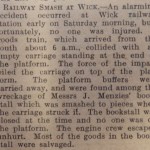This week in Iraq, the RAF inflicted heavy losses on the pro-Axis government forces. The British navy captured German submarine U-110 on 9 May and with it an undamaged “Enigma” cipher machine as well as its code books; this would help the British break the Enigma code. Also this week, senior Nazi Rudolf Hess flew to Scotland on his own initiative to negotiate peace with Britain (where he was immediately arrested). And in one of the last acts of the Blitz German planes heavily bombed British cities, including London and Clydeside; from now on, German resources would be targeted against the planned invasion of the Soviet Union.
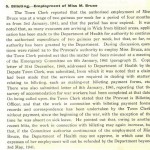 As a result of the bombing of British cities, “many evacuees are arriving in Wick from blitzed areas”. The Burgh had employed a temporary clerkess, Miss M Bruce, to handle the paperwork associated with billeting; but now the Burgh minutes noted that her wages wouldn’t be refunded by the Department of Health past the beginning of the month, even if “owing to another recent blitz, the work in connection with billeting may again increase”.
As a result of the bombing of British cities, “many evacuees are arriving in Wick from blitzed areas”. The Burgh had employed a temporary clerkess, Miss M Bruce, to handle the paperwork associated with billeting; but now the Burgh minutes noted that her wages wouldn’t be refunded by the Department of Health past the beginning of the month, even if “owing to another recent blitz, the work in connection with billeting may again increase”.
Schools in Caithness were now back after the Easter break, and work began on planting the gardens. Stemster 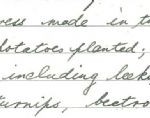 School recorded in the log book on 8 May, “Good progress made in the School Garden; 1 plot of potatoes planted; several rows of vegetables including leeks, parsley, parsnips, carrots, turnips, beetroot and lettuce.”
School recorded in the log book on 8 May, “Good progress made in the School Garden; 1 plot of potatoes planted; several rows of vegetables including leeks, parsley, parsnips, carrots, turnips, beetroot and lettuce.”
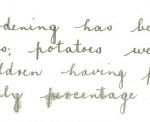 The next day, Dunnet School noted: “Some gardening has been undertaken by the pupils; potatoes were planted to-day – the children having provided the seed.”
The next day, Dunnet School noted: “Some gardening has been undertaken by the pupils; potatoes were planted to-day – the children having provided the seed.”
Daily life in Caithness continued to be hazardous, and not only from enemy action. The police 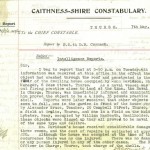 recorded on 7 May that Thurso had been shelled with practice shells from a British ship: “I beg to report that at 5-50pm on Tuesday 6th instant … that an object had crashed through the roof and penetrated to the ground floor of the dwelling house occupied by John Davidson, Shop Manager, 6 Rose Street, Thurso.” Other shells landed on 20 Campbell Street, Thurso, in a field at Ormlie, Thurso, and at Lybster in Reay. No one was hurt, and investigations revealed that the shells came from a naval vessel which had been “carrying out firing practice close to land at the time.”
recorded on 7 May that Thurso had been shelled with practice shells from a British ship: “I beg to report that at 5-50pm on Tuesday 6th instant … that an object had crashed through the roof and penetrated to the ground floor of the dwelling house occupied by John Davidson, Shop Manager, 6 Rose Street, Thurso.” Other shells landed on 20 Campbell Street, Thurso, in a field at Ormlie, Thurso, and at Lybster in Reay. No one was hurt, and investigations revealed that the shells came from a naval vessel which had been “carrying out firing practice close to land at the time.”
Finally this week, the John O’Groat Journal reported an alarming “railway smash at Wick” early on Saturday morning. An incoming goods train ploughed into an empty carriage standing at the end of the platform: the carriage was driven up on the platform, the buffers were carried away, and the J Menzies bookstall was “smashed to pieces when the carriage struck it”. Luckily there was no one on the platform at the time and the bookstall was closed, and no one was hurt.